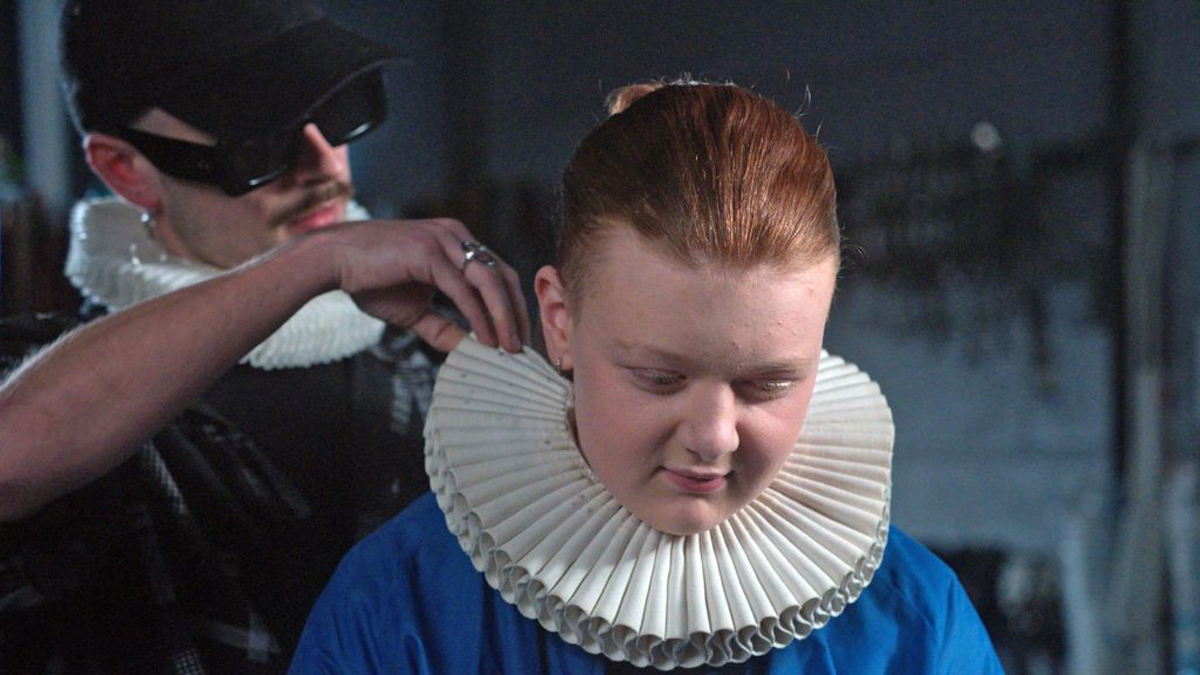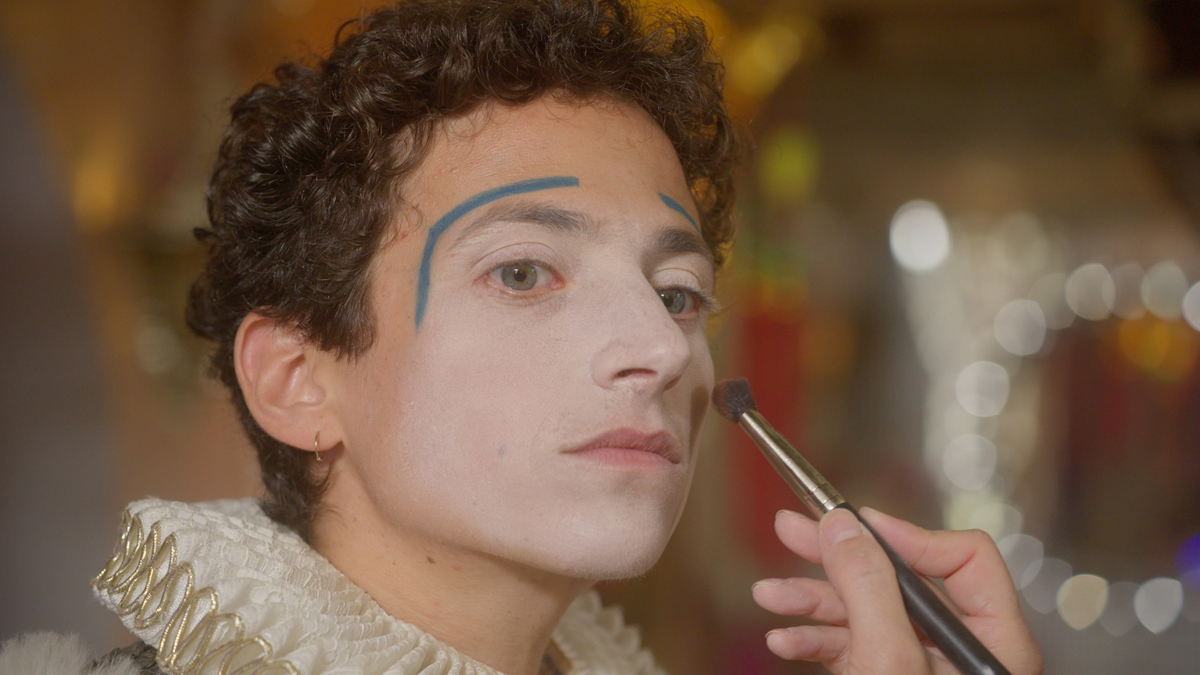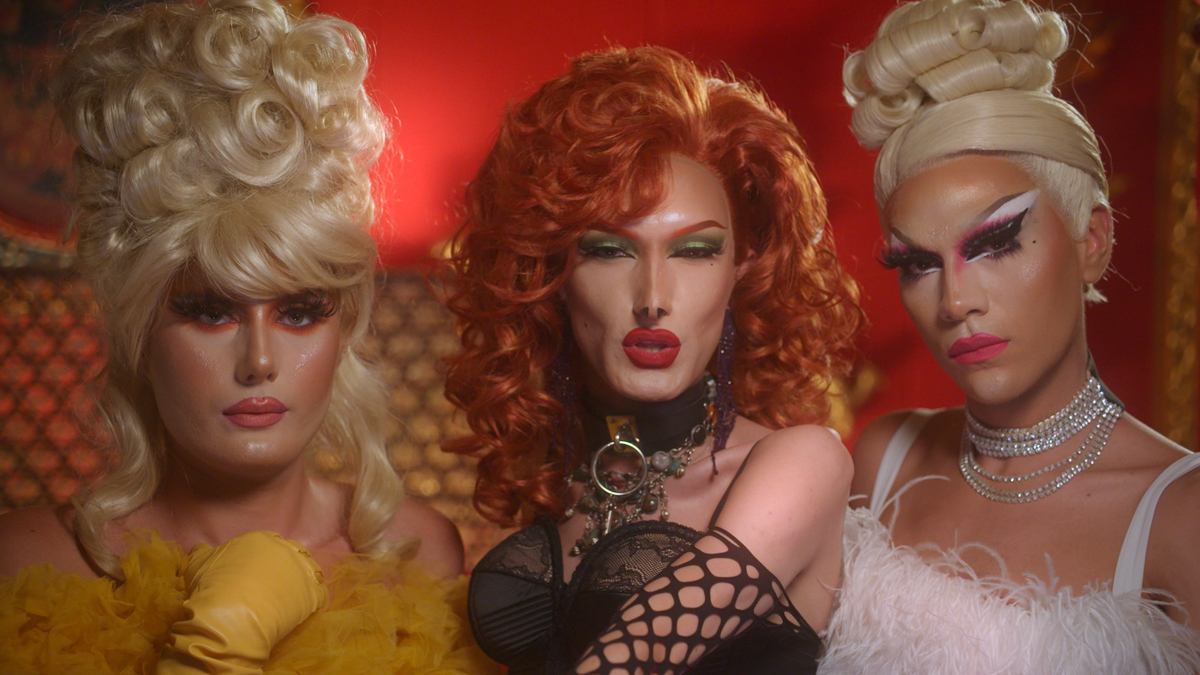 Thora Siemsen
Thora Siemsen
Paul B. Preciado mixes Woolf’s gender-bending novel with the personal stories of a trans and nonbinary cast to moving and inventive effect.

Ruben Rizza (right) as Orlando in Orlando, My Political Biography. Courtesy Film Forum.
Orlando, My Political Biography, directed by Paul B. Preciado, opening November 10, 2023 at Film Forum, 209 West Houston Street, New York City, opening November 17, 2023 in Los Angeles
• • •
In her 1928 novel Orlando: A Biography, about an Elizabethan nobleman living for centuries and changing genders along the way, Virginia Woolf sought to obliterate time. Even so, the book was launched into the real world, subject to the standards of its day. Radclyffe Hall’s lesbian classic, The Well of Loneliness, was released the same year and resulted in an obscenity trial in Britain, with Winston Churchill piling on the efforts to suppress its publication. Orlando, on the other hand, with its fantastical bent, soared past the censors. And yet, only this past summer, Vox, Spain’s far-right nationalist party, gained power in the local government of Valdemorillo, a municipality of Madrid, where it successfully canceled a local theatrical production of Orlando, labeling it obscene. Right on time, the Spanish-born writer and philosopher Paul B. Preciado has come out with his first film, Orlando, My Political Biography.

Oscar Miller as Orlando in Orlando, My Political Biography. Courtesy Film Forum.
Preciado was initially approached by Arte, the French public-service channel, to make a documentary about his life. Instead, he pitched an experimental adaptation (in the loosest sense of the term) of Woolf’s already inventive work. Astonishingly, the TV executives agreed. The result is an elastic essay film with occasional musical numbers featuring more than twenty trans and nonbinary individuals, of various ages, races, and nationalities, each assuming the role of Orlando. These participants, sometimes wearing Elizabethan-style ruffs or chain mail over street clothes, incorporate chronicles of their own gender journeys into recitations of Woolf’s novel. French nightlife legend Jenny Bel’Air and the writer and filmmaker Virginie Despentes make memorable appearances. The latter, Preciado’s former lover, plays a judge conferring “planetary, nonbinary citizenship” on the Orlandos following the “collapse of the patriarchal-colonial regime” in the year 2028. Given the state of affairs in 2023, the prediction seems anachronistic, like it was imagined in a distant, more optimistic past, but—fingers crossed!

Elios Levy as Orlando in Orlando, My Political Biography. Courtesy Sideshow and Janus Films.
Preciado is best known for his 2008 book Testo Junkie, a manifesto in which he describes the salutary effects of small daily doses of testosterone. In it, he uses his own transition as a backdrop to consider how modern forces like pornography and the birth-control pill have shaped desire. Intriguingly, in his film, he seems to most appreciate Orlando as an enduring representation of transness divorced from a medical context. In the movie’s stirring voice-over—which Preciado himself delivers, in a rare instance of that device working well—he tells us that reading Woolf’s novel as an adolescent gave him the impression a sex change would happen in his slumber, through the work of dreaming. (He credits the book with his ongoing habit of sleeping well.)

Koriangelis Brawns as Orlando, Liz Christin as Orlando, and Vanasay Khamphommala as Orlando in Orlando, My Political Biography. Courtesy Sideshow and Janus Films.
In one scene in Orlando, My Political Biography, some of Preciado’s cast members (plus the director himself) appear stuck in a waiting room, anointing each other with hormones—placing estrogen pills on tongues, administering shots of T in asses, using gels as if they were hand sanitizer—while queuing for a psychiatrist named Dr. Queen. The room transforms into a neon-hued disco, and they begin dancing to a song with the lyrics: “You are not the doctor’s bitch.” I couldn’t wait for this number to end. While the use of music in the movie largely succeeds, this particular number is goofy, gratuitous. It detracts from Preciado’s astute linking of the long history of psychiatry’s transphobic bias to Woolf’s personal hardships.

Le Filip as Goddess of Gender Fucking, Tristana Gray Martyr as Goddess of Hormones, and Miss Drinks as Goddess of Insurrection in Orlando, My Political Biography. Courtesy Sideshow and Janus Films.
In a project otherwise filled with moving present-day testimonials, among the movie’s most powerful moments are the archival-footage segments, featuring such trans icons as Christine Jorgensen and Coccinelle. Both women had an Orlando-esque experience of transitioning abroad and returning to their native countries, to be reintroduced to the world transformed. It’s beautiful to see clips of them descending different aircraft stairs, touching down in their new lives. We learn that Jorgensen, one of the most talked-about and telegenic trans women of the twentieth century, became a film editor. And Coccinelle (whose moniker is the French word for “ladybug”) emerges as a clairvoyant in black-and-white talk-show footage, circa late ’60s, discussing women she met on her global travels: “I don’t call them transsexuals. I say women of the year 2000. We will soon be the women of the year 2000.”

Amir Baylly as Orlando in Orlando, My Political Biography. Courtesy Film Forum.
Preciado’s film is not the first adaptation of Woolf’s novel. The best known is the British filmmaker Sally Potter’s Orlando, released in 1992, when Section 28—a piece of legislation introduced by Thatcher’s government in 1988 that prohibited the “promotion” of homosexuality by local authorities—was still on the books. Potter’s Orlando, which came out when Preciado turned twenty-two, featured gender-blind casting and queer romance, and was a commercial success despite the repressive climate. It raised both the profile of star Tilda Swinton, until then most associated with the films of Derek Jarman, and the bar for costuming and set design in period pieces. Preciado’s version, with a ruff here and there, is pared-down and punk in comparison, and, despite the wardrobe nods, uninterested in competing with Potter’s lavish visuals. Where Potter’s film hews more closely to the original text, Preciado’s teems with original ideas.

Koriangelis Brawns as Orlando in Orlando, My Political Biography. Courtesy Film Forum.
Several times in his movie, Preciado directly addresses Woolf. These declamations are an effort to explain his strange affinity with her strange book, and his sense of it as his own memoir: “Nothing could be further from the existence of the son of a garage owner and a seamstress in an anonymous town in the north of Spain than the life of Orlando, inspired by your lover Vita Sackville-West,” he notes. Orlando, of course, is fictional, not a realistic portrait of the patrician writer, and in this way, Preciado’s own biography and geography are less important than a truth both he and Woolf wink at: that we are all Orlandos, all capable of reinvention. “To be trans is to discover the backstage of sexual and gender difference,” he says. “To understand that a society is a collectively constructed set and that masculinity and femininity are political fictions, which we have learned to perceive as natural through repetition and violence.” With this statement, he alludes to one of the longest-running shows of our time. We could call it: Who’s Afraid of Trans People?
Thora Siemsen recently contributed an essay on Martin Scorsese’s Alice Doesn’t Live Here Anymore (1974) and other films set in Arizona to DO NOT DETONATE Without Presidential Approval: A Portfolio on the Subjects of Mid-Century Cinema, the Broadway Stage and the American West (Pushkin Press, 2023), edited by Jake Perlin. She lives in rural Colorado and works in outreach for her local public library.